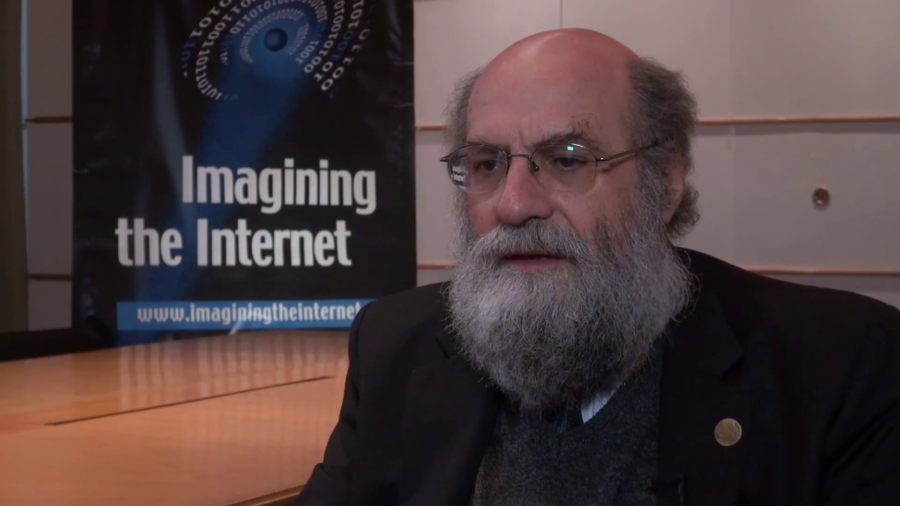Demi Getschko: “Leader” is too strong a word, but anyway I am part of— The Internet is a collaborative effort. All the people voluntarily cooperate to have the network in place. I was involved in the networking in Brazil since the very beginning. I worked for an institution where the first the Internet connection was made. We began with an academic network in ’88, but initially with BITNET and then HEPnet. HEPnet stands for High Energy Physics Network. It’s a network based on DECnet, an old proprietary protocol.
Then in ’89 we got .br delegated to the Brazilian initiative, and we connected to the Internet in ’91, when our connection point in the US, the Fermi National Accelerator Laboratory went to the Internet, joining the ESnet—Energy Sciences Network at that time. Then from ’91 so now we of course saw the Internet growing more and more and other networks appearing. And what we have now is that the Internet is a very powerful net.
Intertitle: Describe one of the breakthrough moments of the Internet in which you have been a key participant?
Getschko: Well I guess in the late 80s, for example, in most parts of the world there was a commitment from the governments and the telecom agencies to stick to the OSI protocols, the ISO OSI protocols from at that time CCITT. Then changed it to I2. Then it was really a difficult time or a struggle to make TCP/IP prevail because there was a commitment from the governments to go ahead with the ISO stack. But anyway, we all in some way proved that TCP/IP was the real solution, a better solution at that time, and we got the providers and the operators to begin to offer this kind of service. And this was a really important change to the Internet, because otherwise we would have some kind related to the telco regulators and so on.
Intertitle: Discuss your expectations for the future of the Internet.
Getschko: Okay, I’m a very bad prophet. I never know where things are going. But I keep being surprised with the energy and the stability and the possibility to grow that the Internet showed all this time. In the beginning we had a network based in text, basically. And then in ’92 or ’93 in Brazil the Web became a reality. The Web brings a lot of new users to the network, with all the family photos and the photos of the dogs and other things. It was a totally different thing.
But in some ways, the initial concepts survived and the Internet could evangelize the new commerce to their own principles. It was very good. Then in some way the network defends itself against ideas that are not compatible with their concept.
And now we’re seeing more and more videos and other media. I suppose more than half of the traffic is not related anymore to email or to text, but to video and entertainment. It’s also in Brazil that entertainment is a good part of the traffic on the Internet. And we expect this to keep growing, because the bandwidth is more or less cheap now with fiber optic fibers. They provided a very good compromise between price and bandwidth and service, and you have the computer power growing each year. And then you can have both of the best faces of the coin. You have the growth in bandwidth and growing computer power. And I think we’ll see the Internet growing more and more and giving power to the common citizen, to the people.
Intertitle: What are your greatest hopes and fears for the future of the Internet?
Getschko: The Internet in some ways kind of ruptured, if you look at all the structures and all the economical models and so on. In this way, the Internet represents also a threat to the status quo in many business operations and so on. Then of course the well-established status quo in some ways fears the Internet. And there are some threats that the Internet has faced in these years. We expect of course that the Internet will survive through these threats, keeping the original concepts of inclusiveness, of openness, of being a collaborative effort with voluntary inclusion of everyone that wants to be there. But of course you have to take care about the threats and the risks we are running right now, and we are all struggling to get the Internet as it was and it is now.
Intertitle: What action should be taken to ensure the best possible future?
Getschko: I think that what we have to do now is to make the awareness of that bigger and bigger to the other people. We have a lot of events that are related to Internet governance. We will have in this month in Brazil the Net Mundial, an event that will discuss principles to in some way protect the Internet and also a road map for the ecosystem. And we respect to have good results from that meeting. I suppose the best way to protect the Internet is to explain the Internet to other people, and show— But it’s easy for them to understand the qualities and the possibilities the Internet brings, but in some cases they cannot understand the governance thing. How something like the Internet that is multistakeholder, is not dependent on governments or regulators, can grow in such a good way. Then I suppose our mission is to keep this on the right track.
